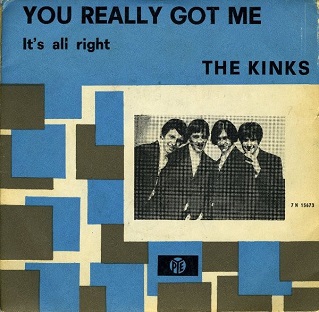
"You Really Got Me" is a song by English rock band the Kinks, written by frontman Ray Davies. The song, originally performed in a more blues-orientated style, was inspired by artists such as Lead Belly and Big Bill Broonzy. Two versions were recorded, with the second performance used for the final single. Lead guitarist Dave Davies performs the song’s famous guitar solo. Although it was long rumoured that future Led Zeppelin guitarist Jimmy Page had performed the song's guitar solo, this has been debunked by Page himself.
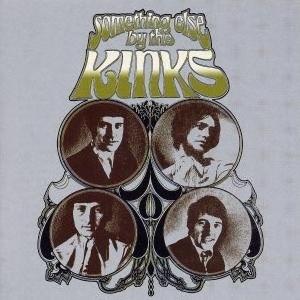
Something Else by the Kinks, often referred to simply as Something Else, is the fifth studio album by the English rock band the Kinks, released on 15 September 1967 by Pye Records. The album continued the Kinks' trend toward an eccentric baroque pop and music hall-influenced style defined by frontman Ray Davies' observational and introspective lyrics. It also marked the final involvement of American producer Shel Talmy in the Kinks' 1960s studio recordings; henceforth Ray Davies would produce the group's recordings. Many of the songs feature the keyboard work of Nicky Hopkins and the backing vocals of Davies's wife, Rasa. The album was preceded by the singles "Waterloo Sunset", one of the group's most acclaimed songs, and the Dave Davies solo record "Death of a Clown", both of which charted in the UK top 3.
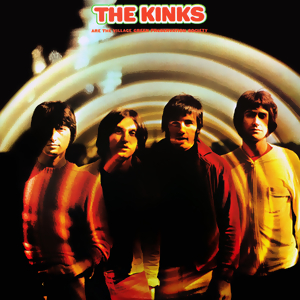
The Kinks Are the Village Green Preservation Society is the sixth studio album by the English rock band the Kinks. Released on 22 November 1968, Village Green is regarded by commentators as an early concept album. A modest seller on release, it was the band's first studio album which failed to chart in either the United Kingdom or United States, but was lauded by contemporary critics for its songwriting. It was embraced by America's new underground rock press, completing the Kinks' transformation from mid-1960s pop hitmakers to critically favoured cult band.

Arthur (Or the Decline and Fall of the British Empire), often referred to simply as Arthur, is the seventh studio album by the English rock band the Kinks, released on 10 October 1969. It was the first Kinks album to feature bassist John Dalton, who replaced Pete Quaife. Kinks frontman Ray Davies constructed the concept album as the soundtrack to a Granada Television play and developed the storyline with novelist Julian Mitchell; the television programme was never produced. The rough plot revolved around Arthur Morgan, a carpet-layer, who was based on Ray and guitarist Dave Davies' brother-in-law Arthur Anning. A stereo version was released internationally with a mono version being released in the UK, but not in the US.
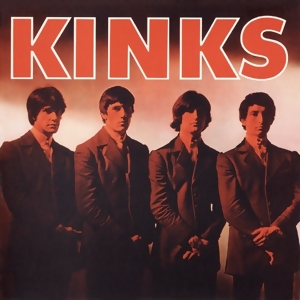
Kinks is the debut studio album by the English rock band the Kinks. It was released on 2 October 1964 in the United Kingdom by Pye Records. The original United States release, issued by Reprise Records on 25 November 1964, omits three tracks and is instead titled You Really Got Me.
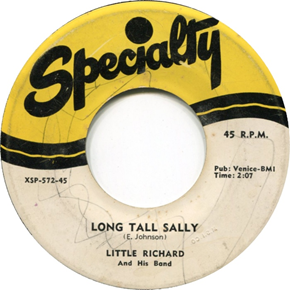
"Long Tall Sally", also known as "Long Tall Sally (The Thing)", is a rock and roll song written by Robert "Bumps" Blackwell, Enotris Johnson, and Little Richard. Richard recorded it for Specialty Records, which released it as a single in March 1956, backed with "Slippin' and Slidin'".
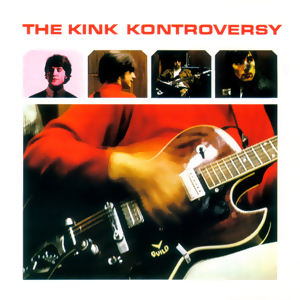
The Kink Kontroversy is the third studio album by the English rock band the Kinks. It was released on 26 November 1965 in the United Kingdom by Pye Records. Issued in the United States by Reprise Records on 30 March 1966, it was the Kinks' first American album to feature an identical track listing to its British counterpart. It is a transitional album, with elements of both the earlier Kinks' styles and early indications of the future direction of Ray Davies' songwriting styles. The liner notes were written by Michael Aldred.

The Kinks were an English rock band formed in London in 1963 by brothers Ray and Dave Davies. They are regarded as one of the most influential rock bands of the 1960s. The band emerged during the height of British rhythm and blues and Merseybeat, and were briefly part of the British Invasion of the United States until their touring ban in 1965. Their third single, the Ray Davies-penned "You Really Got Me", became an international hit, topping the charts in the United Kingdom and reaching the Top 10 in the United States.

"See My Friends" is a song by the English rock band the Kinks, written by the group's singer and guitarist, Ray Davies. Released in July 1965, it reached number 10 on the Record Retailer chart. The song incorporates a drone-effect played on guitar, evoking a sound reminiscent of the Indian tambura.

"Sunny Afternoon" is a song by the Kinks, written by frontman Ray Davies. The track later featured on the Face to Face album as well as being the title track for their 1967 compilation album. Like its contemporary "Taxman" by the Beatles, the song references the high levels of progressive tax taken by the British Labour government of Harold Wilson, although it does so through the lens of an unsympathetic aristocrat bemoaning the loss of his vast unearned wealth. Its strong music hall flavour and lyrical focus was part of a stylistic departure for the band, which had risen to fame in 1964–65 with a series of hard-driving, power-chord rock hits.

The Kinks Greatest Hits! is a compilation album by the English rock band the Kinks. Released in the United States in August 1966 by Reprise Records, the album mostly consists of singles issued by the group between 1964 and 1966. The band's first greatest hits album, it remained on the Billboard Top LPs chart for over a year, peaking at number 9, making it the Kinks' highest charting album in the US. The album was in print for decades and was the Kinks' only gold record in America until 1980.

"Dead End Street" is a song by the British band the Kinks from 1966, written by main songwriter Ray Davies. Like many other songs written by Davies, it is to some degree influenced by British Music Hall. The bass playing was partly inspired by the "twangy" sound of Duane Eddy's guitar. It was originally released as a non-album single, but has since been included as one of several bonus tracks from the Face to Face CD. The song, like many others by the group, deals with the poverty and misery found in the lower classes of English society.

Kinksize Session is the first EP released by the Kinks in the UK in 1964, a month after their debut LP. The tracks were all exclusive to this release and it includes some original compositions.

Kwyet Kinks is the third EP by the English rock band the Kinks. It was released on 17 September 1965 in the United Kingdom by Pye Records. Driven by the inclusion of the song "A Well Respected Man", Kwyet Kinks topped sales charts in Britain for several weeks. In the United States, which had no corresponding market for EPs, Reprise Records instead used its songs as the basis for the November 1965 LP Kinkdom.
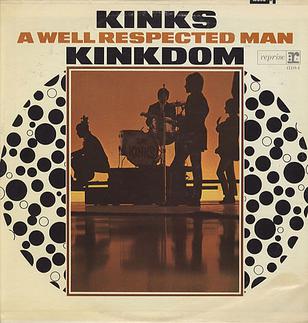
Kinkdom is a studio album by the English rock band the Kinks, released as their fourth album in the United States. It was issued by Reprise Records on 24 November 1965 in both mono and simulated stereo formats. It peaked at number 47 on the Billboard album chart.
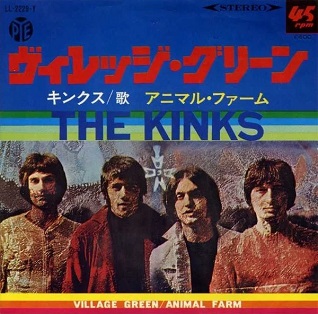
"Village Green" is a song by the English rock band the Kinks from their 1968 album The Kinks Are the Village Green Preservation Society. Written and sung by the band's principal songwriter, Ray Davies, the song was first recorded in November 1966 during the sessions for Something Else by the Kinks (1967) but was re-recorded in February 1967. Both the composition and instrumentation of "Village Green" evoke Baroque music, especially its prominently featured harpsichord played by session keyboardist Nicky Hopkins. Unlike most of the band's late 1960s recordings, it employs real orchestral instruments, including oboe, cello, viola and piccolo, as arranged by English composer David Whitaker.
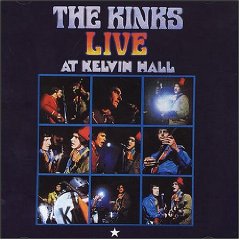
Live at Kelvin Hall is a live album by the English rock group the Kinks. It was recorded at Kelvin Hall in Glasgow, Scotland, in early 1967 and released in August 1967 in the US, and January 1968 in the UK. Live at Kelvin Hall received mixed reviews upon release, and sold poorly.

"She's Got Everything" is a song written by Ray Davies and released by English rock band the Kinks. It first appeared as the B-side of the Kinks' 1968 single, "Days".

"Berkeley Mews" is a song by the English rock band the Kinks. It was released on a non-album single in June 1970, as the B-side to "Lola". Written and sung by bandleader Ray Davies, the song was recorded in early 1968 during the sessions for The Kinks Are the Village Green Preservation Society (1968). The title references a small street in London, while the lyrics recount a one-night stand. Influenced by the music of the 1940s, the song employs a heavier production than was typical for the band's 1968 work.

Then Now and Inbetween is a promotional compilation album by the English rock band the Kinks. Reprise Records issued the album in July 1969 to journalists, radio program directors and disc jockeys in conjunction with the "God Save the Kinks" promotional campaign, which sought to reestablish the Kinks' commercial status in the US after their four-year ban on performing in the country.





















